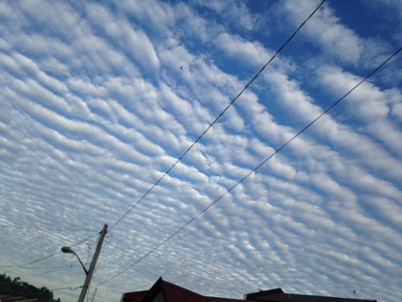About Me
I’m a Ph.D. student in Atmospheric Sciences at Howard University, Washington, D.C. My dissertation research is on studying wave-like perturbations near the exosphere of Mars through molecular gas modeling. These waves can be caused by wind shears, convection or topography, and are observed to heat up the thermosphere-exosphere layers potentially enhancing gas escape rates and impacting lower-upper atmosphere coupling.
 Figure: An image showing gravity waves make characteristic cloud patterns in the atmosphere of Earth.
Figure: An image showing gravity waves make characteristic cloud patterns in the atmosphere of Earth.
Research Interests
- Planetary atmospheres
- Molecular gas dynamics
- Exoplanets
- Machine learning applications in atmospheric science
Education
- Ph.D. in Atmospheric Sciences, Howard University, Washington, D.C. (Expected 2026)
- M.S. in Physics, Texas State University, San Marcos, TX (2022)
- B.S. in Physics & Astronomy, University of Arizona, Tucson, AZ (2020)
Co-Author Publications
- Banzatti, A., et al. (including Chávez, J. P.). The kinematics and excitation of infrared water vapor emission from planet-forming disks. Astron. J., 165, 72, 2023. doi:10.3847/1538-3881/aca80b
- Douglas, S. T., et al. (including Pérez Chávez, J. A.). Constraining stellar rotation at the zero-age main sequence with TESS. Astrophys. J., 962, 16, 2024. doi:10.3847/1538-4357/ad0fe3
- Gibbs, A., et al. (including Perez Chavez, J.). EDEN: Sensitivity analysis and transiting planet detection limits for nearby late red dwarfs. Astron. J., 159, 169, 2020. doi:10.3847/1538-3881/ab7926
- Lin, C.-L., et al. (including Chavez, J. P.). EDEN: Flare activity of the nearby exoplanet-hosting M dwarf Wolf 359 based on K2 and EDEN light curves. Astron. J., 162, 11, 2021. doi:10.3847/1538-3881/abf933
Current Projects
- Developing machine learning techniques for classifying single-particle mass spectra at Brookhaven National Lab.
- Integrating atmospheric perturbation subroutines into a Fortran molecular kinematic model (HARRAH) at NASA/GSFC.
- Applying data-driven techniques on the NExSCI NASA Exoplanet Archive planetary datasets to classify and identify diverse worlds that exist beyond our solar system along with collaborations at the Carnegie Institution for Science.
Skills
- Programming Languages: Fortran, Python, SQL, Java, Javascript
- Technologies: Linux systems, WSL, AWS
- Data analysis and visualization
- Machine learning
- Molecular gas kinetic modeling